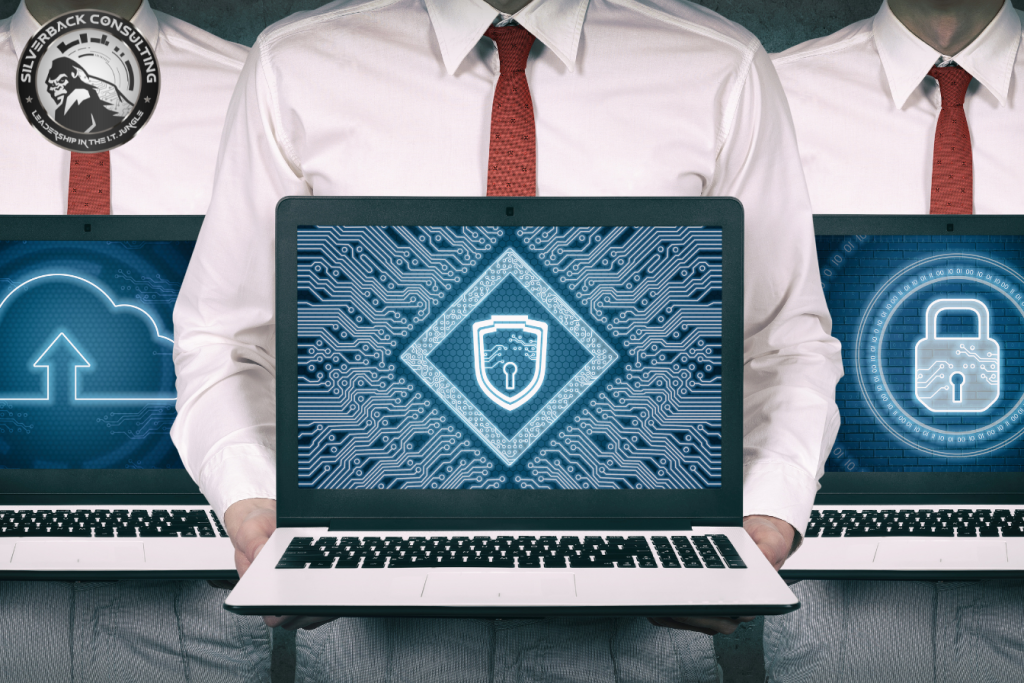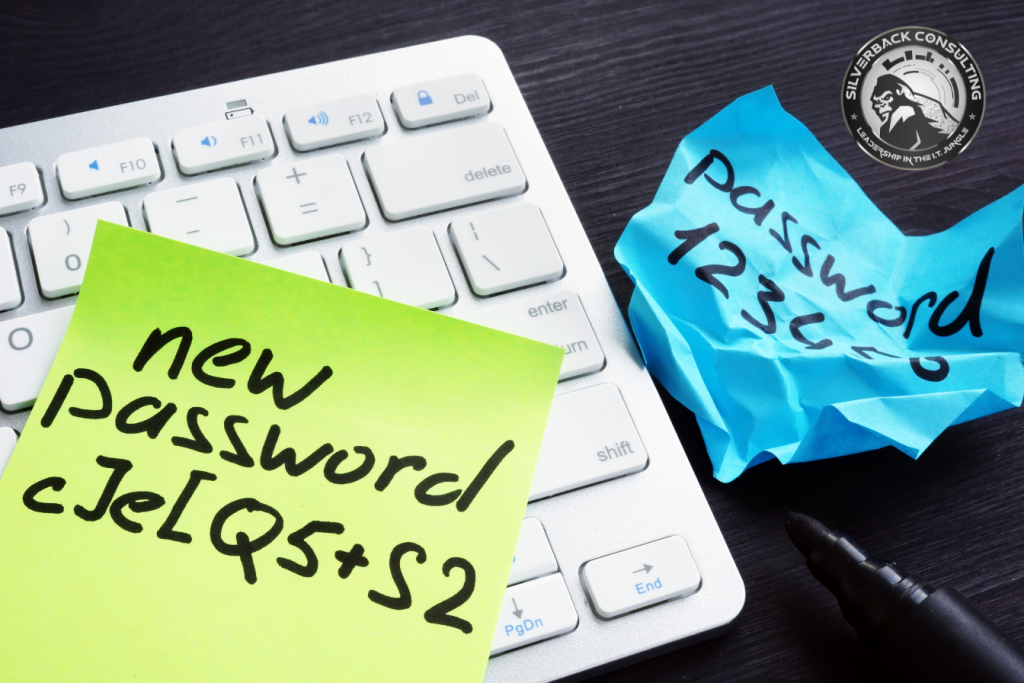Introduction
Have you ever wondered why cybersecurity for small businesses is now headline news?
As more companies adopt cloud services, digital payment systems and remote work tools, even the smallest organization holds data that cybercriminals want.
In 2025, experts warn that small and medium‑sized businesses (SMBs) are being targeted nearly four times more than large organizations.
Yet despite the rising number of attacks, only a small minority of businesses feel prepared: a major survey of over 5,000 business owners across four continents found that 46% of SMBs have already experienced a cyberattack, and nearly one in five attacked firms filed for bankruptcy or closed.
Protecting your company is no longer optional, it’s an essential part of doing business.

Why is Cybersecurity Crucial for Small Businesses?
Many entrepreneurs assume they’re too small to attract hackers, but the statistics show a different story. Accenture’s Cybercrime Study reports that 43% of cyberattacks target small businesses, and yet only 14% of SMBs are prepared to defend themselves. This highlights how vital cybersecurity for small businesses really is.
The financial impact can be devastating: SMBs spend between US $826 and US $653,587 per cyber‑incident, and the average loss due to cyberattacks is estimated at US $25,000.
Worse still, human error plays a role in 95% of breaches, meaning that without proper training, employees can unknowingly open the door to an attack.
Cyberattacks don’t just cause immediate financial harm; they erode trust. After an attack, 80% of affected small businesses spent time rebuilding trust with clients and partners. Comprehensive cybersecurity solutions for small businesses can help prevent these costly disruptions.
The reputational damage can linger for years, jeopardizing customer relationships and vendor agreements. That’s why strong cybersecurity for small businesses is integral to your long‑term reputation and revenue.
What are the Biggest Cybersecurity Threats Facing Small Businesses in 2025?
Digital threats evolve constantly. By 2025, analysts predict that ransomware‑as‑a‑service will become widespread, allowing less‑skilled criminals to purchase ready‑made malware kits.
According to industry experts, small businesses are low‑hanging fruit for these attacks because of limited resources. An infection encrypts your data and demands a ransom; failure to pay often leads to leaked or permanently lost files.
Advanced phishing tactics are also growing more sophisticated.
Attackers use artificial intelligence to craft highly personalized phishing emails that mimic trusted senders. A single click can reveal login credentials or install malware.
Insider threats — whether intentional or accidental are another concern; employees with broad access may inadvertently expose sensitive data.
Supply chain attacks exploit vulnerabilities in third‑party software or vendors, enabling hackers to infiltrate multiple companies through a single compromised supplier.
How Can Small Businesses Build a Strong Cybersecurity Foundation?
Every company, no matter the size, can implement cybersecurity for small businesses best practices.
The good news is that there are clear, actionable steps every small business can take to reduce risk.
The U.S. Federal Communications Commission (FCC) offers 10 essential cybersecurity tips, and they remain relevant in 2025:
- Train employees in security principles. Establish and enforce policies for strong passwords, appropriate internet use and the handling of customer data.
- Protect your computers and networks. Keep operating systems, browsers and antivirus software up to date; enable automatic scans after each update.
- Provide firewall security. Ensure your network’s firewall is enabled and install a reputable firewall for employees working from home or remotely.
- Create a mobile device action plan. Require password protection on phones, encrypt data and install security apps. Establish procedures for reporting lost or stolen devices.
- Make backup copies of important data. Schedule automatic backups at least weekly and store copies offsite or in a secure cloud service.
- Control physical access and user accounts. Prevent unauthorized use of company devices by locking them when unattended; create unique user accounts for each employee with appropriate privileges.
- Secure your Wi‑Fi. Hide your network’s service set identifier (SSID), use strong encryption and protect access with a complex password.
- Use best practices on payment cards. Work with your bank or payment processor to ensure you’re using validated anti‑fraud tools and isolate payment systems from general internet browsing.
- Limit employee privileges. Give staff access only to the systems and data they need and restrict permission to install software.
- Implement robust passwords and authentication. Require employees to use unique passwords and update them regularly; implement multi‑factor authentication (MFA) where available.
These are foundational cybersecurity solutions for small businesses that every owner should know.
Implementing these fundamentals dramatically reduces your attack surface. While they require an initial investment of time and resources, they cost far less than dealing with a ransomware or data‑breach crisis.
How Important are Strong Passwords and Multi‑factor Authentication?

Weak or reused passwords are among the most common points of entry for hackers. We at Silverback Consulting recommend using password managers to generate unique, complex passwords and changing default device credentials.
It is also recommended to implement MFA, especially phishing‑resistant MFA, on all accounts that support it.
MFA requires an additional verification step, such as a one‑time code or biometric scan, making it far harder for attackers to compromise accounts even if a password is stolen.
Why is Employee Education Critical in Cybersecurity for Small Businesses?
Human mistakes remain the leading cause of breaches. In a Mastercard survey, 73% of small business owners said getting employees to take cybersecurity seriously is a challenge. Ongoing training is one of the most affordable yet effective cybersecurity solutions for small businesses.
Regular training sessions, whether through in‑person workshops, webinars or online modules, teach staff how to identify suspicious emails, use secure practices and report incidents promptly.
Training should be continuous because cyber threats evolve and employees forget practices over time.
Consider implementing simulated phishing exercises to test readiness. After each exercise, debrief with your team to discuss what worked, what didn’t and how to improve.
Encouraging a culture of security awareness makes everyone part of the defense, turning employees from potential liabilities into your first line of defense.
What Role Does Regular Updates and Patching Play?
Routine updates are one of the simplest cybersecurity solutions for small businesses to prevent data breaches.
Outdated software is a gateway for attackers who exploit known vulnerabilities.
We at Silverback Consulting recommend installing and maintaining updated antivirus software and applying patches as soon as new versions are available.
Setting devices to update automatically reduces the risk of forgetting to apply critical patches. This principle applies to servers, laptops, mobile devices, routers and even smart office equipment like printers or IoT sensors.
When evaluating software vendors, choose those that provide timely security updates and clear communication about vulnerabilities.
How Can You Protect Your Business from Phishing and Scams?

Phishing attacks typically arrive via email or text message, impersonating trustworthy entities to trick recipients into clicking malicious links. To defend against them:
- Use email filtering to block known malicious links and attachments.
- Educate employees to scrutinize email addresses, avoid clicking on unexpected links and report suspicious messages.
- Adopt MFA, so compromised credentials alone aren’t enough to access systems.
- Regularly back up data so you can restore systems if ransomware slips through.
Additionally, train employees to verify unusual requests by phone or internal messaging rather than responding directly to email.
Attackers often create a sense of urgency (“urgent invoice,” “CEO request”) to bypass skeptical thinking.
How to Choose the Right Cybersecurity Partner for your Small Business?
Many small businesses lack the budget or in‑house expertise to manage security alone.
Partnering with a trusted cybersecurity provider gives you access to advanced tools and experienced professionals without hiring a full‑time team. When evaluating partners:
- Check credentials and certifications. Look for providers compliant with standards such as ISO 27001, SOC 2 or NIST frameworks.
- Ask about their services. A reliable partner should offer risk assessments, vulnerability scanning, firewall management, endpoint protection, incident response and employee training.
- Consider industry expertise. Security requirements differ across sectors (e.g., healthcare, retail, finance). Choose a firm familiar with your industry’s regulations.
- Evaluate communication and support. Ensure they provide clear reports, regular updates and rapid responses to incidents.
At Silverback Consulting, we specialize in cybersecurity for small businesses, offering end-to-end cybersecurity solutions for small businesses including risk assessment, monitoring, cyber risk assessments, deploys managed security tools, employee training, offers continuous monitoring to detect and respond to threats.
We also provide incident response plans and more, ensuring your business is prepared for whatever the digital world brings.
What Should You Do if Your Small Business Experiences a Cyberattack?
Preparation is key, but no defense is foolproof. If you suspect a security incident:
- Contain the breach. Disconnect affected systems from the network to stop the spread of malware.
- Activate your incident response plan. Notify your cybersecurity partner, internal stakeholders and legal council.
- Preserve evidence. Avoid wiping affected systems until a qualified professional has collected logs and artifacts.
- Notify affected parties. If customer data is involved, you may be legally obligated to notify them and relevant regulators.
- Restore from backups. Recover your systems using clean backups and confirm that vulnerabilities have been addressed.
- Review and improve. After the incident, conduct a post‑mortem to identify what went wrong and update policies, training and technology accordingly.
Conclusion: Secure Today, Succeed Tomorrow
Cyber threats aren’t going away; they’re evolving.
For small businesses, robust cybersecurity for small businesses is not just about technology, it’s about protecting your people, your customers and your reputation.
By following best practices, educating your team and partnering with experienced professionals like Silverback Consulting, you can navigate the digital landscape confidently and focus on growing your business.
FAQS
How much should a small business invest in cybersecurity?
There is no one‑size‑fits‑all answer. A good rule of thumb is to allocate at least 5% to 10% of your IT budget to security. Consider factors such as the sensitivity of the data you handle, regulatory requirements and the potential financial impact of downtime or data loss. The cost of prevention is almost always lower than the cost of recovery.
Can cyber insurance help?
Yes, cyber insurance can cover costs associated with data breaches, ransomware payments, legal fees and business interruption. However, insurers often require proof of good security practices and may not cover claims if negligence is found. Treat insurance as a safety net, not a substitute for robust cybersecurity measures.
Do small businesses need compliance frameworks?
Depending on your industry, you may have to comply with regulations like HIPAA, PCI DSS or GDPR. Even without regulatory obligations, adopting recognized frameworks such as the NIST Cybersecurity Framework or ISO 27001 helps organize your security efforts and demonstrates due diligence to customers and partners.
How can we ensure our remote employees are secure?
Remote work introduces additional risks. Require remote employees to use VPNs, keep their devices up to date and connect through secure Wi‑Fi networks. Provide them with company‑approved security tools, enforce MFA and deliver regular training focused on working securely from home.
What’s the cost of cybersecurity for small businesses?
It varies by size and complexity, but most small businesses spend between $1,000 and $10,000 per year on cybersecurity tools, monitoring, and training.
How much do companies spend on cybersecurity?
Larger companies may allocate 10–15% of their IT budgets, while small businesses usually invest 5–10%—enough to protect sensitive data and customer trust.
Why do small businesses need cybersecurity?
Because hackers often target smaller companies that lack strong defenses. A single breach can cost thousands and damage your reputation permanently.
What happens if my small business gets hacked?
You could lose customer data, face legal issues, or experience long-term downtime. Quick response and recovery are crucial to minimize damage.
Do small businesses really need cybersecurity, or is it just for big companies?
Yes, small businesses are four times more likely to be attacked than large corporations. Cybersecurity isn’t optional, it’s a basic business necessity.
How do I protect customer data without a huge IT department?
Use managed services, encryption, secure cloud backups, and employee training. Or partner with experts like Silverback Consulting to handle it for you.
Who can help me set up affordable cybersecurity for my small business?
Fill out our contact form below. Our team provides affordable cybersecurity solutions for small businesses, from audits to ongoing protection.
How often should we back up data?
The FCC recommends backing up critical data at least weekly. For businesses that update data more frequently, daily or continuous backups may be appropriate. Ensure backups are encrypted and stored offline or in a secure cloud environment.
How much does a cyberattack cost a small business?
The average loss per incident is around $25,000, but some breaches exceed $100,000 once downtime and recovery costs are factored in.
Can a small business survive a data breach?
It’s possible, but difficult. About 60% of small businesses close within six months of a major breach. Prevention is far cheaper than recovery.
What are the real risks of skipping cybersecurity for small business?
Data theft, ransomware, financial fraud, lost clients, and reputational harm. Without protection, you’re gambling with your company’s future.
What’s the best cybersecurity plan for a small retail store?
Combine secure POS systems, firewalls, employee training, and regular software updates. A managed security partner can help tailor it to your store.
What are the most common cyberattacks on small businesses in 2025?
Phishing, ransomware, credential theft, and supply-chain attacks are among the top threats this year.
How can I protect my small business without hiring a full IT team?
Outsource to a managed cybersecurity provider like Silverback Consulting for continuous protection at a fraction of in-house costs.
How do I teach employees about cybersecurity without boring them?
Use short, interactive training sessions and phishing simulations to keep learning practical and engaging.
What’s the best way to stop staff from falling for phishing scams?
Train them to check sender details, avoid clicking suspicious links, and report anything unusual immediately.
How often should small businesses train employees on cybersecurity?
At least twice a year, plus quick refreshers when new threats emerge or systems change.
Can I automate cybersecurity updates for my business?
Yes. Most security software and operating systems allow automatic patching to keep your defenses current.
What should I ask before hiring a cybersecurity consultant?
Ask about certifications, industry experience, 24/7 support, and how their services scale with your business.
What should I ask before hiring a cybersecurity consultant?
Ask about certifications, industry experience, 24/7 support, and how their services scale with your business.
Is it better to outsource cybersecurity or hire in-house?
For most small businesses, outsourcing is more cost-effective. You get expert protection without full-time salaries.
Can I get customized cybersecurity for my industry?
Absolutely. Silverback Consulting offers industry-specific cybersecurity solutions tailored to healthcare, retail, finance, and more.
My business got hacked. What should I do first?
Disconnect affected systems, contact your cybersecurity provider immediately, and preserve evidence before restoring from clean backups.
Shield Your Business Before It’s Too Late—Talk to a Cybersecurity Expert Today!
Cyber threats don’t wait and neither should you. Our team at Silverback Consulting helps small businesses strengthen their defenses, protect sensitive data, and stay compliant with evolving regulations. Whether you’re facing a security issue or want to prevent one, call us today at (719) 452-2205 for immediate assistance.
Prefer to reach out online? Simply fill out the form below, and our cybersecurity experts will contact you shortly to discuss how we can secure your business.
Silverback Consulting
303 South Santa Fe Ave
Pueblo, CO 81003
719-452-2205
support@silverbackconsulting.us
“Leadership in the I.T. Jungle”




